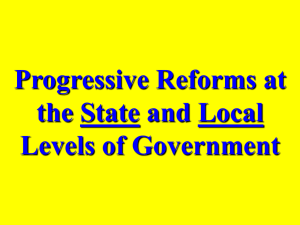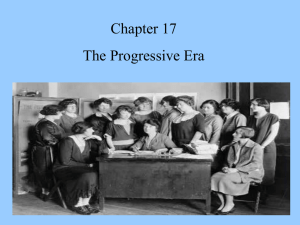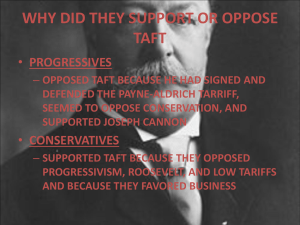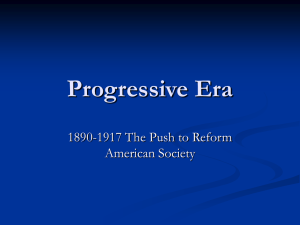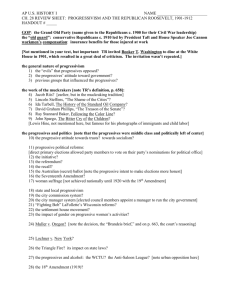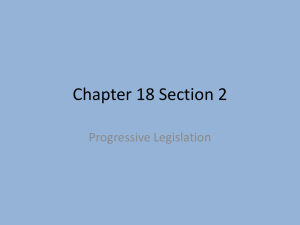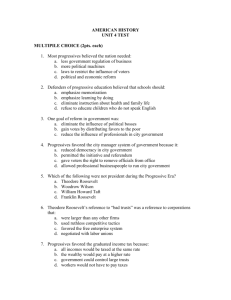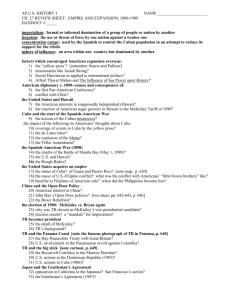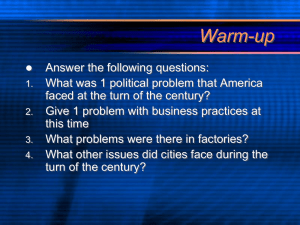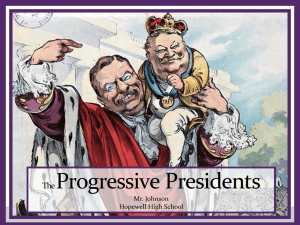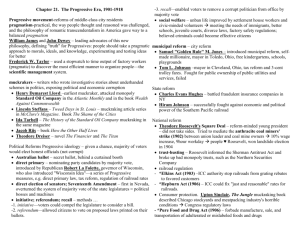The Progressive Movement Review
advertisement
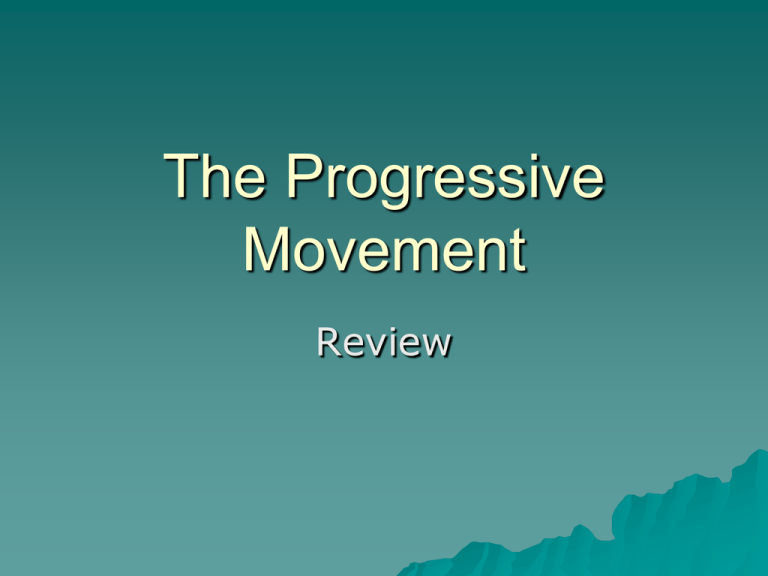
The Progressive Movement Review Which amendment made it legal for the federal government to tax the incomes of individuals directly? The 16th Amendment, 1913 True or False? Progressivism was an organized movement that worked together to achieve a set of agreed-upon reforms. False. Often progressives had many different views about how to fix the problems they believed existed. True or False? Progressives thought that be applying scientific principles to society, they could fix its problems. True! True or False? Theodore Roosevelt believed that most trusts benefited the economy and breaking them up would do more harm than good. True! True or False? Progressives were pleased with William Howard Taft for pushing through the Payne-Aldrich Tariff. False! Progressives felt betrayed and outraged by his decision. They felt the “fire had gone out of the progressive movement” True or False? President Roosevelt was opposed to big business. False! He felt big business was part of the reason American was so prosperous. True or False? The Federal Reserve Act of 1913, which established regional reserve banks, became one of the most significant pieces of legislation in American history. True! Socialists believed in a. b. c. d. No government Private ownership of business Government ownership of business Government regulation of business Answer: D Regulation of business In the case Northern Securities v. the U.S., the Supreme Court ruled that Northern Securities a. b. c. d. Violated the Clayton Antitrust Act Violated the Sherman Antitrust Act Would be placed under the supervision of the Bureau of Corporations. Would be placed under the supervision of the Interstate Commerce Commissioon Answer: B Violated the Sherman Antitrust Act Wisconsin became the “laboratory of democracy” because of its a. b. c. d. Consumer protection laws Reforms that broke the power of party bosses. Efforts for woman’s suffrage. Antitrust laws. Answer: B Reforms gave the people back the power; away from the party bosses who, at that time, controlled local government. Theodore Roosevelt tried to win the Republican nomination from William Howard Taft in the 1912 election because he believed that Taft c. Did not deal with trusts aggressively enough. Had failed to live up to progressive ideals. Could not defeat Woodrow Wilson. d. Was too slow in pushing for tariff reform. a. b. Answer: B Had failed to live up to progressive ideals. In a direct primary, a. b. c. d. All party members vote for delegates to the party’s convention. The party’s state legislators vote for delegates to the party’s convention. All party members vote for a candidate to run in the general election. The party’s state legislators vote for a candidate to run in the election. Answer: C All party members vote for a candidate to run in the general election. The Constitution originally specified that senators would be selected by a. b. c. d. The legislature of each state. The voters of each state. The majority party in each state. Leaders of the majority party. Answer: A The legislature of each state. Tragedy at the Triangle Shirtwaist Company led to a. b. c. d. Child labor laws Standards for safe use of machines. Laws against harmful fumes. Building codes requiring fire escapes. Answer: D Building codes required fire escapes. The laissez-faire argument for the best way to preserve public land was to a. b. c. d. Keep it under government control and not allow companies to use it. Keep it under government control, but allow its use for land development projects. Sell it to lumber companies, who would conserve it as a source of profits. Sell it to private individuals, who would conserve it because it belonged to them. Answer: C Sell it to lumber companies, who would conserve it as a source of profits. Political reform first came to the state level when Wisconsin voters elected as governor, Republican a. b. c. d. Charles Edward Russell Frederick W. Taylor Jacob Riis Robert La Follette Answer: D Robert La Follette What did progressives think needed to play a more active role in solving society’s problems? a. b. c. d. The government The churches Social welfare organizations Big business Answer: A The Government! A law that divides a town or city into areas for commercial, residential, or other development is called this. What is a zoning law? Allowed a group of citizens to introduce legislation and required the legislature to vote on it. What is an initiative? Cities run by people who had expertise in city services. What is a commission plan of government? Movement for the moderation or elimination of alcohol. What is the temperance movement? Someone who exposed corruption and scandal. What is a muckraker? Insurance fund financed by employers if a worker was hurt on the job. What is workers’ compensation? Allowed proposed legislation to be submitted to the voters for approval. What is a referendum? He tried to open nearly a million acres of public land to private development. What is Richard A. Ballinger She wrote articles criticizing Standard Oil. Who is Ida Tarbell? The right to vote. What is suffrage? Roosevelt’s reform programs. What was the “Square Deal”? Woodrow Wilson’s program was called this. What is New Freedom? Created to monitor American business. What is the Federal Trade Commission, or FTC? Taft fired Pinchot for ______, or disobedience. Insubordination.
